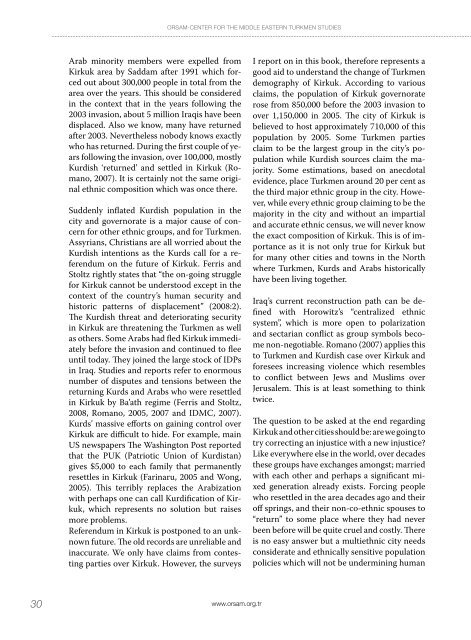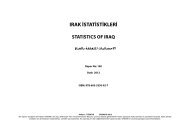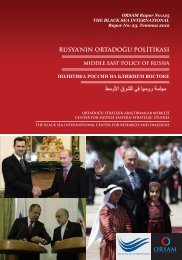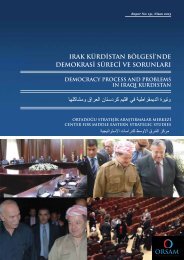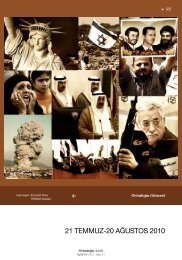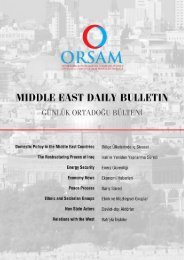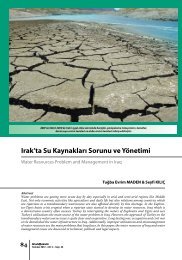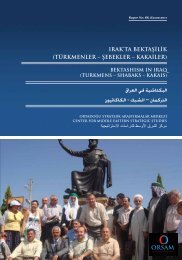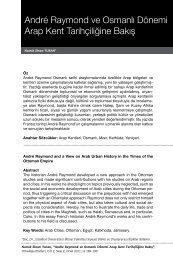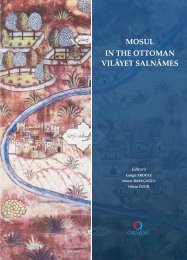turkmen in iraq and their flight - orsam
turkmen in iraq and their flight - orsam
turkmen in iraq and their flight - orsam
Create successful ePaper yourself
Turn your PDF publications into a flip-book with our unique Google optimized e-Paper software.
ORSAM-CENTER FOR THE MIDDLE EASTERN TURKMEN STUDIES<br />
Arab m<strong>in</strong>ority members were expelled from<br />
Kirkuk area by Saddam after 1991 which forced<br />
out about 300,000 people <strong>in</strong> total from the<br />
area over the years. This should be considered<br />
<strong>in</strong> the context that <strong>in</strong> the years follow<strong>in</strong>g the<br />
2003 <strong>in</strong>vasion, about 5 million Iraqis have been<br />
displaced. Also we know, many have returned<br />
after 2003. Nevertheless nobody knows exactly<br />
who has returned. Dur<strong>in</strong>g the first couple of years<br />
follow<strong>in</strong>g the <strong>in</strong>vasion, over 100,000, mostly<br />
Kurdish ‘returned’ <strong>and</strong> settled <strong>in</strong> Kirkuk (Romano,<br />
2007). It is certa<strong>in</strong>ly not the same orig<strong>in</strong>al<br />
ethnic composition which was once there.<br />
Suddenly <strong>in</strong>flated Kurdish population <strong>in</strong> the<br />
city <strong>and</strong> governorate is a major cause of concern<br />
for other ethnic groups, <strong>and</strong> for Turkmen.<br />
Assyrians, Christians are all worried about the<br />
Kurdish <strong>in</strong>tentions as the Kurds call for a referendum<br />
on the future of Kirkuk. Ferris <strong>and</strong><br />
Stoltz rightly states that “the on-go<strong>in</strong>g struggle<br />
for Kirkuk cannot be understood except <strong>in</strong> the<br />
context of the country’s human security <strong>and</strong><br />
historic patterns of displacement” (2008:2).<br />
The Kurdish threat <strong>and</strong> deteriorat<strong>in</strong>g security<br />
<strong>in</strong> Kirkuk are threaten<strong>in</strong>g the Turkmen as well<br />
as others. Some Arabs had fled Kirkuk immediately<br />
before the <strong>in</strong>vasion <strong>and</strong> cont<strong>in</strong>ued to flee<br />
until today. They jo<strong>in</strong>ed the large stock of IDPs<br />
<strong>in</strong> Iraq. Studies <strong>and</strong> reports refer to enormous<br />
number of disputes <strong>and</strong> tensions between the<br />
return<strong>in</strong>g Kurds <strong>and</strong> Arabs who were resettled<br />
<strong>in</strong> Kirkuk by Ba’ath regime (Ferris <strong>and</strong> Stoltz,<br />
2008, Romano, 2005, 2007 <strong>and</strong> IDMC, 2007).<br />
Kurds’ massive efforts on ga<strong>in</strong><strong>in</strong>g control over<br />
Kirkuk are difficult to hide. For example, ma<strong>in</strong><br />
US newspapers The Wash<strong>in</strong>gton Post reported<br />
that the PUK (Patriotic Union of Kurdistan)<br />
gives $5,000 to each family that permanently<br />
resettles <strong>in</strong> Kirkuk (Far<strong>in</strong>aru, 2005 <strong>and</strong> Wong,<br />
2005). This terribly replaces the Arabization<br />
with perhaps one can call Kurdification of Kirkuk,<br />
which represents no solution but raises<br />
more problems.<br />
Referendum <strong>in</strong> Kirkuk is postponed to an unknown<br />
future. The old records are unreliable <strong>and</strong><br />
<strong>in</strong>accurate. We only have claims from contest<strong>in</strong>g<br />
parties over Kirkuk. However, the surveys<br />
I report on <strong>in</strong> this book, therefore represents a<br />
good aid to underst<strong>and</strong> the change of Turkmen<br />
demography of Kirkuk. Accord<strong>in</strong>g to various<br />
claims, the population of Kirkuk governorate<br />
rose from 850,000 before the 2003 <strong>in</strong>vasion to<br />
over 1,150,000 <strong>in</strong> 2005. The city of Kirkuk is<br />
believed to host approximately 710,000 of this<br />
population by 2005. Some Turkmen parties<br />
claim to be the largest group <strong>in</strong> the city’s population<br />
while Kurdish sources claim the majority.<br />
Some estimations, based on anecdotal<br />
evidence, place Turkmen around 20 per cent as<br />
the third major ethnic group <strong>in</strong> the city. However,<br />
while every ethnic group claim<strong>in</strong>g to be the<br />
majority <strong>in</strong> the city <strong>and</strong> without an impartial<br />
<strong>and</strong> accurate ethnic census, we will never know<br />
the exact composition of Kirkuk. This is of importance<br />
as it is not only true for Kirkuk but<br />
for many other cities <strong>and</strong> towns <strong>in</strong> the North<br />
where Turkmen, Kurds <strong>and</strong> Arabs historically<br />
have been liv<strong>in</strong>g together.<br />
Iraq’s current reconstruction path can be def<strong>in</strong>ed<br />
with Horowitz’s “centralized ethnic<br />
system”, which is more open to polarization<br />
<strong>and</strong> sectarian conflict as group symbols become<br />
non-negotiable. Romano (2007) applies this<br />
to Turkmen <strong>and</strong> Kurdish case over Kirkuk <strong>and</strong><br />
foresees <strong>in</strong>creas<strong>in</strong>g violence which resembles<br />
to conflict between Jews <strong>and</strong> Muslims over<br />
Jerusalem. This is at least someth<strong>in</strong>g to th<strong>in</strong>k<br />
twice.<br />
The question to be asked at the end regard<strong>in</strong>g<br />
Kirkuk <strong>and</strong> other cities should be: are we go<strong>in</strong>g to<br />
try correct<strong>in</strong>g an <strong>in</strong>justice with a new <strong>in</strong>justice?<br />
Like everywhere else <strong>in</strong> the world, over decades<br />
these groups have exchanges amongst; married<br />
with each other <strong>and</strong> perhaps a significant mixed<br />
generation already exists. Forc<strong>in</strong>g people<br />
who resettled <strong>in</strong> the area decades ago <strong>and</strong> <strong>their</strong><br />
off spr<strong>in</strong>gs, <strong>and</strong> <strong>their</strong> non-co-ethnic spouses to<br />
“return” to some place where they had never<br />
been before will be quite cruel <strong>and</strong> costly. There<br />
is no easy answer but a multiethnic city needs<br />
considerate <strong>and</strong> ethnically sensitive population<br />
policies which will not be underm<strong>in</strong><strong>in</strong>g human<br />
30<br />
www.<strong>orsam</strong>.org.tr


